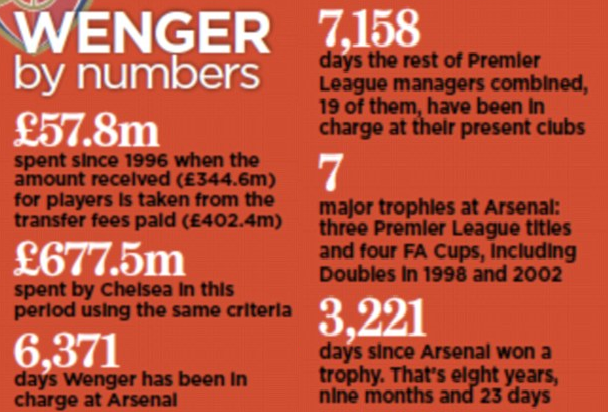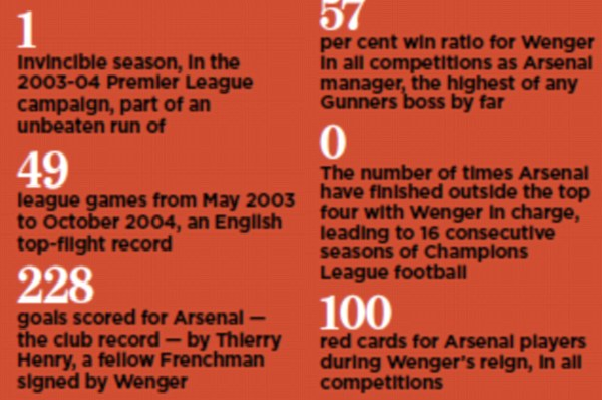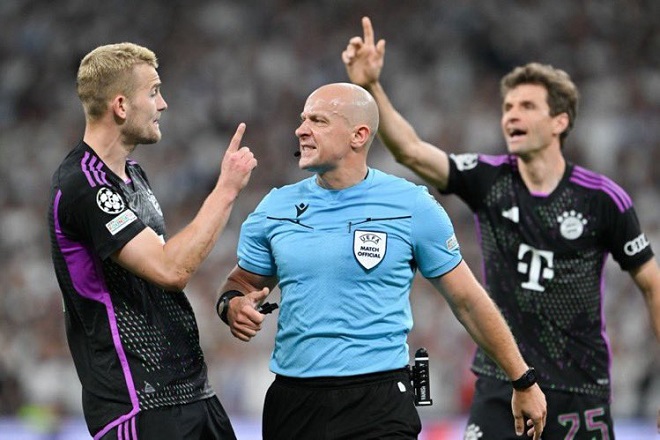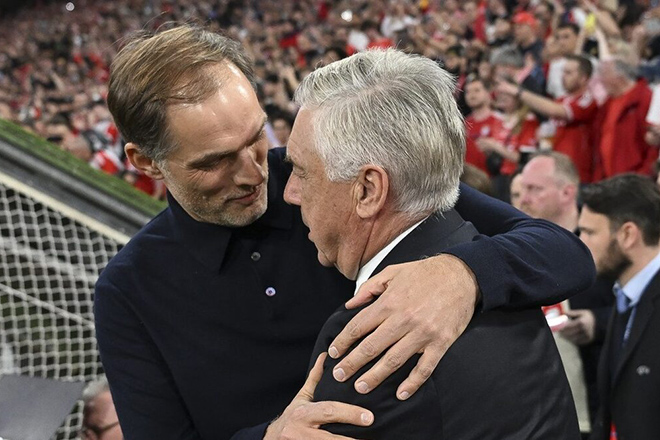 Wenger was appointed the head coach of Arsenal at a time foreign managers had no place in the country. The popular belief was that managers from abroad were unsuited to the English game and this along with his anonymous identity resulted in him being greeted with ‘Arsene Who” headlines in the English press.
Wenger was appointed the head coach of Arsenal at a time foreign managers had no place in the country. The popular belief was that managers from abroad were unsuited to the English game and this along with his anonymous identity resulted in him being greeted with ‘Arsene Who” headlines in the English press.
It was unfathomable that 18 years later Wenger would be celebrating his 1000th game with the club and appointing foreign managers in England will be common practice. The Frenchman has been the cornerstone towards the club’s success and its transformation and here we highlight just how influential the former Monaco tactician has been during his 18 years.
Transforming the club
Upon his arrival, Arsene transformed football not just how it was played at Arsenal but the whole of England benefited from Wenger’s practices. He was one of the first managers to introduce a proper diet plan which effectively enhanced performance. Arsenal teams of yesteryears relied on chocolate bars, chips and alcohol to refuel themselves. But this changed under Arsene Wenger who introduced a strict diet comprising of pasta, white meat, vegetables and mineral water, the effects of which were exceptional as cited by various football experts and former players the most recent of whom was former Liverpool defender Jamie Carragher who expressed just how difficult it was to get the better of an Arsenal player on the pitch.
“Arsenal were the first team to start using creatine — a supplement to help increase strength and power and aid muscle recovery — and we used to hear how they had changed their diets and took the right vitamins. You couldn’t outmuscle Wenger’s sides, nor could you outplay them,” said the former Liverpool man.
Some of the changes the visionary Frenchman brought were reminiscent to those brought by legendary manager Herbert Chapman, who like Wenger was an advocate of attacking football and modern fitness. The style of football quickly changed and Arsenal started playing a more expansive brand of football pleasing to the eye which swiftly buried the ‘boring Arsenal’ chants. His introduction also saw Arsenal bringing in world class foreign players some of whom would go onto establish legendary statuses at the club.
Glory days
Trophies came quick and only in his first full season at the club the Frenchman guided Arsenal to the FA Cup and Premier League double, a feat which was achieved again in the 2001-02 season.
.jpg)
But Arsene’s biggest managerial achievement came in the 2003-04 season when his team won the Premier League title without tasting a defeat as they went on to establish an English record of 49 games unbeaten. In eight of his first eleven years at the club Wenger’s side finished the season in either the first or the second place however on no occasion were the Gunners able to retain the title.
Laying the foundations
Statistically Arsene Wenger is Arsenal’s most successful manager in terms of trophies won, however his role at Arsenal just like Chapman’s in the past goes beyond just winning trophies – Wenger’s philosophy was always to create a legacy. He pushed the board of directors into the idea of constructing a new stadium which was ultimately taken into consideration and Arsenal would shift to their state of the art stadium named ‘The Emirates’ in 2006.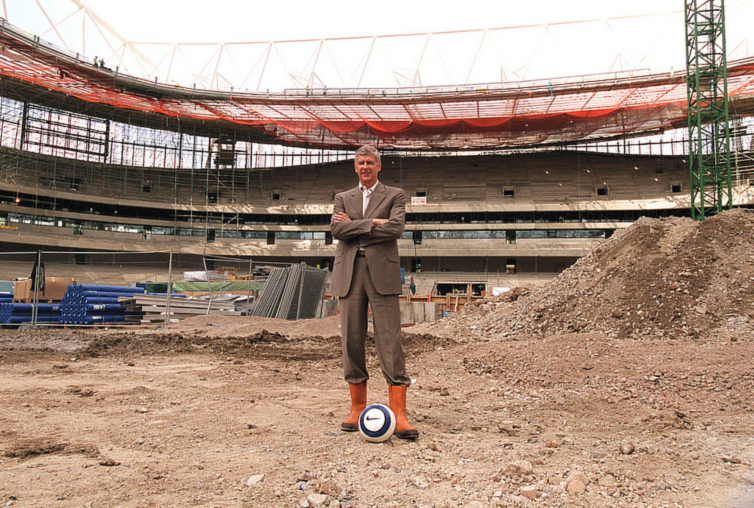
The idea behind reallocating was simple; even though Highbury had its own charm and personified history and character it failed to deliver the income that would ensure sustainability of the club in the long run. The Emirates benefited the club immediately through higher match revenue; however there was a price to be paid and the additional financial burden restrained the club’s activity in the transfer market. Wenger was thus forced to tread carefully and make astute deals which he did and prior to moving to their new stadium Arsenal had acquired potential world class players for bargain prices including the likes of Cesc Fabregas, Kolo Toure and Robin Van Persie.
Staying loyal during the trophy drought
Arsenal were soon struck with the inevitable and a club where a trophy-less season was considered a failure in the past soon became the story of every season. The introduction of oil rich owners in the league saw the likes of Chelsea and Man City spend profligately, whereas Man United despite their severe debt burdens refused to be left behind.
However Arsenal refused to follow suit and stuck to their "self-sustaining model" – as for Arsene he respected the board’s decision and praised it as the responsible way of running the club.
Since their triumphant FA Cup winning campaign in 2005, Arsenal have failed to add silverware to their trophy cabinet in the succeeding eight years. Though the Gunners did come very close on several occasions losing out to Barcelona in 2005-06 Champions League final, surrendering their lead on top in 2007-08 season to finish third and more recently failing to beat Birmingham City in the 2010-11 League Cup final.
Their failure to land a trophy resulted in Arsenal’s best players leaving the club to seek greener pastures but one man who stood faithful was their French manager who refused to be lured by the riches of Real Madrid and PSG and despite of being offered a managerial position in those clubs he maintained his loyalty with the Gunners.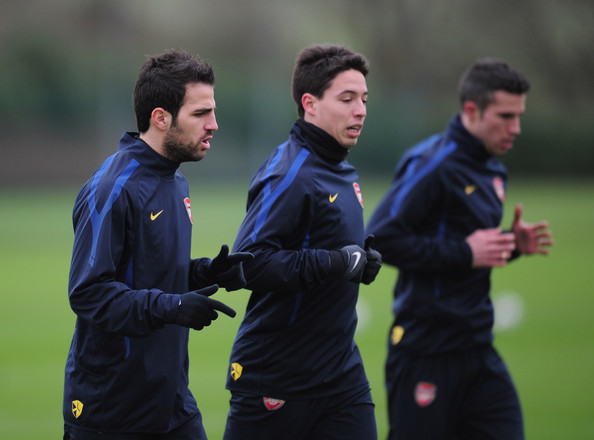
When viewed in isolation Wenger’s last eight years at the club have been a failure and something which would be intolerable at a club like Arsenal. But putting everything in context will make one realise that it is not so bad after all. It is important to take into account that no club other than Arsenal in the Premier League era has built a stadium privately and managed to avoid relegation in the subsequent years.
Arsenal on the other hand successfully built a stadium in one of the most expensive cities in the world and under Arsene Wenger’s management not only continued to challenge for titles but also never failed to qualify for the Champions League.
Arsenal’s net spending over the last ten years has been the fourth lowest among the current teams in the Barclays Premier League. Compared to Arsenal’s net spending of £1.5 million per season, Chelsea have spent an average of £52.5 million per season, Manchester City £46 million per season, Manchester United £18.5 million even newly promoted side Hull City have spent more in net than the Gunners averaging £4.5 million per season.
As a result of the financial sacrifice Wenger had to make, Arsenal now have a splendid stadium that generates a massive amount of revenue which will ensure that Arsenal financially compete with the biggest clubs in the world in the years to come. Throughout the difficult period Wenger remained regal and even though he could have lamented on the lack of resources he demonstrated exemplary desire and loyalty while doing his job.
Moving Forward
With the club having successfully negotiated lucrative sponsorship deals over the last year, the club’s financial stature seems to be very stable and it is now time for Arsenal to start winning trophies again. The Frenchman showed in his early years, his ability to win titles and it is now time for Wenger to return to that level. His 1000th game for the club and those which follow this season will be very crucial to the club in that respect. An FA Cup title and a strong title challenge might be the beginning of a new Wenger era, anything else might result in the end of one of the most commendable managerial careers.
His achievements in numbers
After 899 Games

After 998 games
Wenger by numbers
